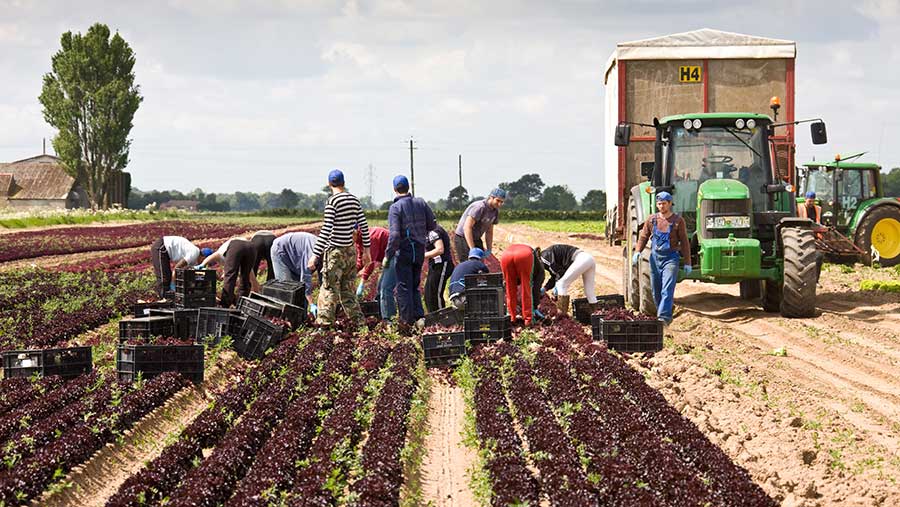Tonnes of food crops ploughed in as labour shortage bites
 © Tim Scrivener
© Tim Scrivener Labour shortages and aggressive retailer pricing policies have forced British growers to plough in hundreds of tonnes of crops this season.
The British Growers Association (BGA) reported that among that total are millions of lettuce heads. Others took to Twitter to highlight cases of crop destruction on a massive scale.
A tweet by investigative journalist Luke Hanrahan showed a salad farm in Kent, where 150t of crop had been wasted due to labour shortages.
See also: ASA bans ‘misleading’ Tesco plant-based burger ads
The crop was in production at LJ Betts in Kent, and suggested 30% of this year’s potential output had been lost because of labour shortages.
A salad farm in Kent where 150 tonnes of crop has been wasted due to labour shortages. Responding to suggestions that farmers should replace EU workers with Brits: “please stop with that rhetoric, it’s absolute garbage.”
More to follow later this week…🥕 🥦 🥗 🗑 pic.twitter.com/Ke0KN6Tyxb— Luke Hanrahan (@LukeHanrahan) June 7, 2022
And a report by The Times featured an onion grower who had ploughed down a field-scale crop worth £75,000 because only 60% of the worker vacancies had been filled.
The farmers blamed the labour shortage on Brexit immigration policy, which had aimed to replace eastern Europeans with British workers. But year after year, home recruitment has failed to draw in the numbers of workers needed.
With a post-Brexit limit of 30,000 overseas workers imposed, and a contingency for 10,000 more, which has now been actioned by government, the UK is still well short of the 70,000-80,000 requirement estimated by the NFU and other grower bodies.
But this year the situation has been made even worse by the conflict in Ukraine. Ukrainian, Russian and Belarusian workers collectively made up more than 75% of the crop picking workforce last year.
BGA chief executive Jack Ward explained the process to rehire the eastern Europeans was at an advanced stage when war broke out in Ukraine in February. As attempts to attract British workers continued to fail, efforts were hurriedly switched to other countries such as Uzbekistan, Kazakhstan and Tajikistan.
“But it meant we were starting again and recruitment was three to four months behind,” Mr Ward said. To make matters worse, the sunny, dry weather in the early part of the spring saw crops forward on previous years.”
Supermarket pricing
Mr Ward pointed out that the labour shortage had come at a time when margins were at an all-time low. Labour costs have gone up by 34%, while fuel and fertiliser prices have soared, Mr Ward said.
Despite news reports of food price hikes, the cost of key produce is the same as it was five years ago or lower.
On supermarket shelves, broccoli is the same price as in 2017, a kilo of carrots is 20p cheaper and a 1.5kg bag of frozen peas was £2 and is now £1.40. The lack of margin was having a devastating effect on producers.
“We import 50% of our vegetables and 75% of fruit when we don’t need to do either. Since 2001 we have lost 70,000ha or 500,000t of vegetable production and doubled our imports – it is a damning indictment of British food policy.”
He predicted this figure will get worse.“Will growers have confidence to stay in vegetable production next year?” he asked.
“The way ahead is to give those farms that are dependent on seasonal workers access to enough labour. And to have a long, hard look at fruit and vegetable prices in supermarkets where retailers are insisting they cannot charge more.”
Mr Ward questioned whether shoppers would stop buying vegetables and fruit if prices were higher – a long-term claim of the retailers.
Fresh produce is cheap when compared with coffee, which has gone up to more than £3 a cup.“For the price of a single coffee and a brownie, you could buy a whole week’s worth of fruit and vegetables,” Mr Ward said.
This situation has to be looked at and the retailers must look at pricing and stop the same old rhetoric, he added.
